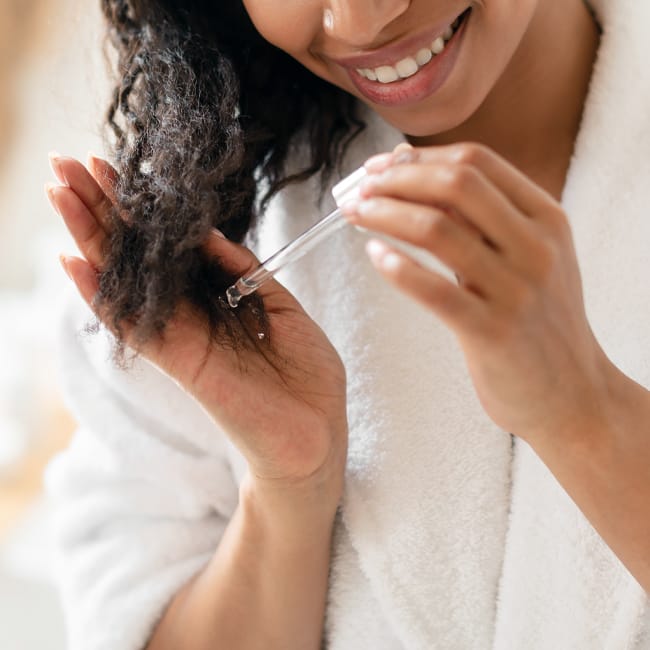When it comes to anti-aging skincare, there are several common mistakes that could actually do more harm to your complexion than good, Dr. Amir Karam. M.D., double board-certified plastic surgeon and skincare expert says.
In a viral YouTube video, he explains which ten mistakes are most crucial to avoid if you want a healthy and effective anti-aging skincare routine, and insight on how to sidestep these common “sabotaging” errors.


10 Anti-Aging Skincare Errors To Avoid For A Healthy Complexion
1. Buying Luxury Moisturizers
The first common mistake that Karam includes is buying luxury or expensive moisturizers regarding anti-aging skincare. He notes that sometimes, we can be misguided by "beautiful bottles" with "elaborate messages" when shopping in department stores, and these products can actually have "no active ingredients" that are beneficial to our skin.
He warns that many labeled "anti-aging creams" do "nothing other than fundamentally moisturize your skin" and you "really do not need an expensive, high-end, luxury moisturizer" if the goal is just to "moisturize your skin." Rather than "falling for the expensive-looking packaging," he stresses "looking at the ingredients." If it doesn't have "active anti-aging ingredients," Karam says that you are "overspending." The ingredients to look out for include "retinol and vitamin C."

2. Avoiding Retinol
Karam says that many people are "afraid of using retinol" after hearing that it isn't best to use it if you're often out in the sun, and that this is a "common misconception." He notes that "avoiding retinol" if you are serious about anti-aging is a big no-no for it has many rejuvenating and wrinkle-blurring benefits. "There probably isn't a more powerful, more important anti-aging active ingredient that you need to include in your skincare routine if in fact you are trying to reverse aging changes."
These include "loss of collagen, pigmentation, cellular growth and life to the skin." Karam points out that you should "always use sunscreen," especially if you are concerned about sun damage," and deems "retinol and sunscreen together" to be a "dream team."

3. Only Using the SPF in Makeup
Many makeup products actually contain SPF, and Karam says that this can be misleading. He says that there is "no more important step that you could take to protect your skin from aging changes than sun protection," and that it's "so critical that you get it right."
If SPF and sunscreen is simply blended into your makeup, and if this is your "only source of sun protection that you're using, there is no chance that you're getting the proper amount of sunscreen on your skin to cover it the way it needs to be covered and be reapplied the way it needs to be reapplied." Karam says to use a "dedicated mineral-based sunscreen" after washing your face in the morning and before applying any makeup at all.

4. Using Laser Treatment As Your Only Skincare
If you often undergo laser treatments but don't "have a good skincare routine or use good skincare habits at home," this defeats the purpose of the treatments, Karam notes. One or two times a year, he says, many people drop "thousands of dollars on a laser treatment or laser series, but in the meantime, they're not using regular sun protection or actives on their skin."
As a result, Karam says that they are "basically getting these little bumps where they get some improvement in their skin and then that time in-between the lasers, they're essentially losing ground again." To avoid this, he stresses the aforementioned points — wearing sunscreen daily and incorporating retinol into your nightly skincare routine.

5. Being Inconsistent with Skincare
According to Karam, the key to an effective skincare routine is maintaining consistency above all else. "Any gains you make [when it comes to your skin health] drift backwards if you stop being consistent with skincare," he says. At the cell level, he explains that when you're using active ingredients like retinol, vitamin C and growth factors, you are "turning on the cells that are producing collagen."
"Remember, skin aging is the loss of collagen," he continues, so when you have a consistent and regular skincare routine with the ingredients listed above, you are "producing, building, strengthening and improving the skin."

6. Over-Exfoliating
Karam notes that "exfoliating too often or using harsh exfoliators" is another common error. While Karam says that exfoliating is a "very important step" in your skincare routine to remove dead skin cells and help cleanse your face and pores, it is possible to over-do it. "The dull top layer of skin accumulates and needs to be removed," he acknowledges, and some of the best ways to exfoliate include "chemical peels, microdermabrasion, mechanical ways and powders."
The skin barrier is a layer that protects the outside and "then gets into the deeper layers of the skin, and it's important that it is intact and healthy," he adds. If you over-exfoliate, you risk "injuring" this vital barrier and a "loss" of healthy oils and moisture. With that said, he points out that it's best to use "enzymatic exfoliators two to three times per week," and abrasive or mechanical exfoliators once every one to two weeks."

7. Using Sunscreen Inconsistently
Karam expands on a point he made earlier, and explains that "too many people are inconsistent with the use of sunscreen." He stresses that the "sun has the most impact on skin aging," as the sun's harmful rays cause "collagen breakdown, pigmentation, dryness," and can accelerate the aging process.
To prevent this, he urges "applying mineral sunscreen throughout the day," even if it is "cloudy or rainy," as the "UV index on those type of days is not zero," and any rays can damage your skin if it is not protected consistently.

8. Using Foaming Cleansers
When it comes to your daily cleanser, Karam recommends avoiding "foaming" kinds, or ones that are "abrasive to the skin, making it damaged and dry." Prolonged use of these can lead to "dryness, more oil production," more pronounced fine lines and wrinkles, and cracking, peeling skin.
Instead, he says to opt for "gentle, non-foaming cleansers," and he also points out that some "gel-based cleansers can take some getting used to at first," but this is the "only type of cleanser you need."

9. Missing Out on Vitamin C
For your skin health, Karam says that vitamin C is "very important topically and orally." Like retinol, he deems vitamin C to be a "powerful active ingredient, an antioxidant, a collagen stimulator and something that reduces pigment production at the cellular level." Topical vitamin C is essential, Karam adds, like in a serum product, and needed to "defy the changes that come with aging." When taken orally, he says that vitamin C is a "building block for collagen," which leads to supple, radiant and glowing skin at any age.
"Collagen, as it's being stimulated by these active ingredients or lasers, requires oral vitamin C in order to become produced, so a key component in collagen synthesis is vitamin C in addition to copper and zinc," he continues. Ultimately, he recommends "getting both topical and oral vitamin C into your daily routine."

10. Misunderstanding Moisturizer
Karam highlights that there is a prevalent misunderstanding regarding the frequency and type of moisturizers to use. Additionally, he says that individuals with oily skin tend to refrain from using moisturizers assuming that it is unnecessary, while many with dry skin think they are the only people who need it. However, Karam clarifies that this notion could lead to more harm than good, as moisturizer is an essential element in maintaining a healthy complexion regardless of one's skin type.
"Oil production happens at the sebaceous glands within our skin. Oil production comes up, it gets onto the surface, then you have oil," he says. "Now if you have oily skin and you add oil to your regimen or hydrate your skin, the production of the sebaceous glands gets reduced because there is already oil there," he goes on, pointing out that this actually balances everything out.
Your ultimate goal, he concludes, is to "create a balanced skin barrier," and this happens when you choose a moisturizer recommended to you by an expert for your skin type, rather than forgoing it and thinking it isn't vital.


























